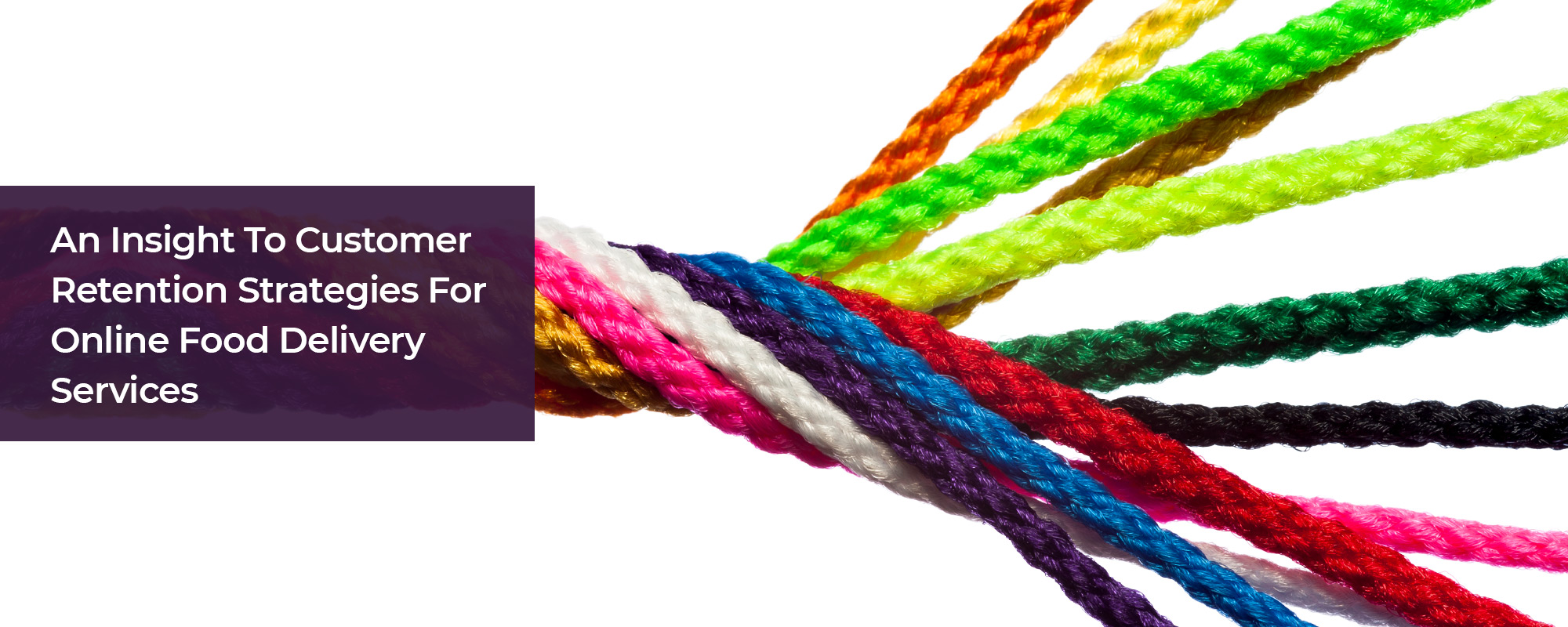A focus on customer retention can catalyze the growth of online food delivery services by fostering customer loyalty and driving higher revenue. Acquiring new customers requires resources, but once a customer has experienced what a business has to offer, it costs much less to retain them.
Moreover, according to the Gartner group, 80% of the money a business intends to make is from 20% of your existing customers. Hence, customer retention strategies can drive more ROI from the marketing efforts and can underpin the success of a food delivery business.
In this article, we discuss metrics used to measure customer retention along with the customer retention strategies for food delivery.
Table Of Content
Metrics To Measure Customer Retention
Customer Churn rate is a parameter that helps in measuring the percentage of customers cutting ties with the company, restaurant, or any other business they have previously transacted with. It is inversely proportional to the customer retention rate. In simpler words, higher the churn rate, lower is the customer retention in the company and vice versa. To calculate the customer churn rate, divide the total number of customers who left the company by the total number of existing customers of the company.
Customer Retention Rate is the number of customers a company can retain or keep in a particular period. It is calculated by dividing the number of retained customers of the company by the total number of customers of the company.
Customer Retention Strategies For Multi-Restaurant Food Delivery Software
Given below are a few ways customers can increase the retention rate of the customer in the company.
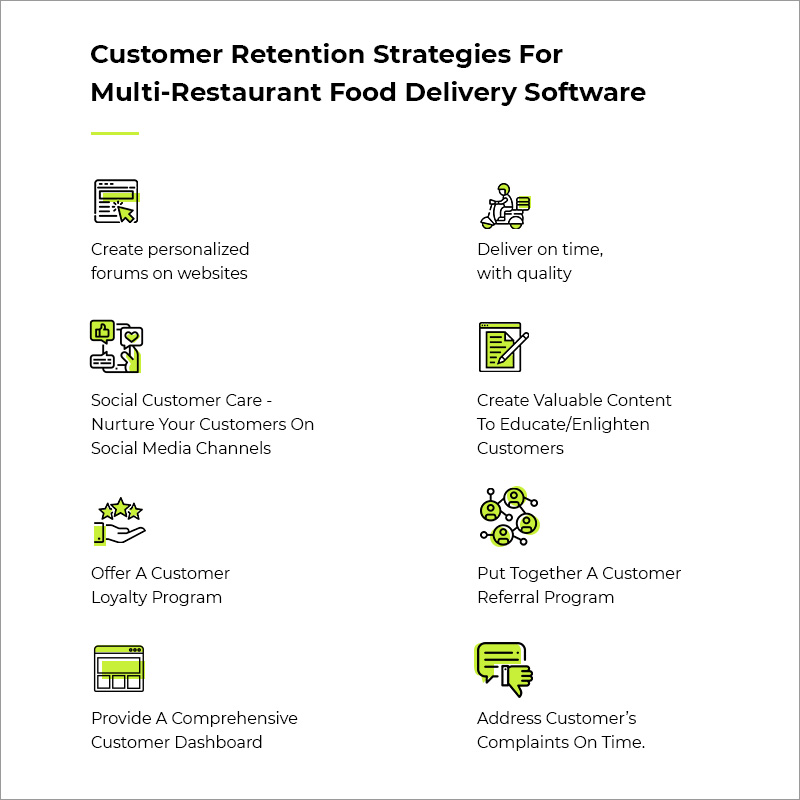
Create personalized forums on websites
A food business revolves around its customers. One of the most important benchmarks of any business roadmap is customer retention. Building forums for customers to connect is a brilliant idea. It helps them share their views and queries as well. Many food delivery websites are coming up with personalized forums. Food-related forums have a wide scope, enormous information can be shared on such forums, as given below.
Related to special diets: Such personal forums, provided by the food delivery websites, give an outlet to these emotions of the customer and let them connect on a personal level, sharing their diet-related experiences, targets, and achievements.
New vendors and chefs: Customers like to try new dishes and cuisines, it has always been an attraction for customers. Many commis chefs are selling their talent in the form of delicious snacks, working in small restaurants. These forums are a great way to give them recognition.
New diners: Any new diner in the market is enticing news for such forums. It helps in advertising these new restaurants. Customers use such forums to post their views both good and bad.
Introducing a new cuisine: Some restaurants introduce new cuisines to increase their publicity. Such forums help in spreading such information and help in marketing new cuisines offered by these restaurants. For instance, restaurants delivering Thai or Italian food in a particular area tend to gain popularity for breaking the monotonous food options.
Deliver on time, with quality
Delivery is one of the most important parts of the food ordering ecosystem. Delayed deliveries harm the lifetime values of the customer. Offering timely delivery with quality delights the customer to order again on the same platform.
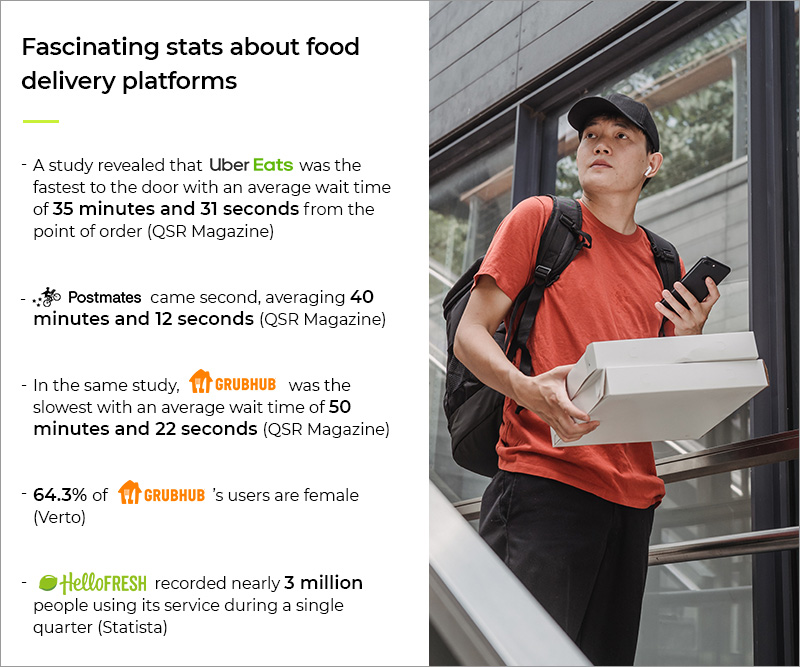
What is On-time delivery?
On-time delivery(OTD) is a parameter used to measure the efficiency of the supply chain. It is a key performance indicator that shows whether a company is performing its delivery services as per the requisites or not. This metric measures both carrier performance and customer satisfaction. As per EY Research, 1 out of 5 customers never goes back to food delivery services that fail to deliver on time.
Most Americans are willing to pay a little extra just for getting their food delivered faster. It’s challenging for food delivery companies to deliver food to the customers whilst it’s hot. Planning the shortest and most efficient path during heavy traffic can be achieved with the help of the fleet management feature of a multi-restaurant food delivery software.
Social customer care is the service provided by contemporary businesses to their customers. A client need not call or place an email to get in actual conversation with the company, they can simply tweet, or connect with the restaurant through Facebook, LinkedIn, and various other social media channels. This trend is gaining popularity by the day.
Reaching out is the key to nurturing your customers to accomplish two main goals. One is to continue being in the good books of your existing clients by providing your services. Another is to establish your brand to attract more customers by marketing your expertise. A few ways to strengthen your relationship with your customers are as follows.
Establish a communication channel with your customers: Communicating with customers through phone and emails is an age-old method. According to a survey conducted by Q2 2016 Sprout Social Index, almost 34.5% of customers prefer communicating with restaurant businesses via social platforms. Communication requires a two-way channel. Social media channels allow company officials to have a dialogue with their potential customers. It allows you to know the most pressing and engaging issues relating to your rapport with your clients.
Choice of social media channels: There are many social platforms, but focussing your resources on the one that is correct for your business is the key. Choose a platform with your brand presence and skillfully weave yourself in the conversation. To enhance customer engagement make sure you do not leave your customers waiting with their queries. A survey by Conversocial states about 88% of customers avoid engaging with brands who leave the customer’s query unanswered.
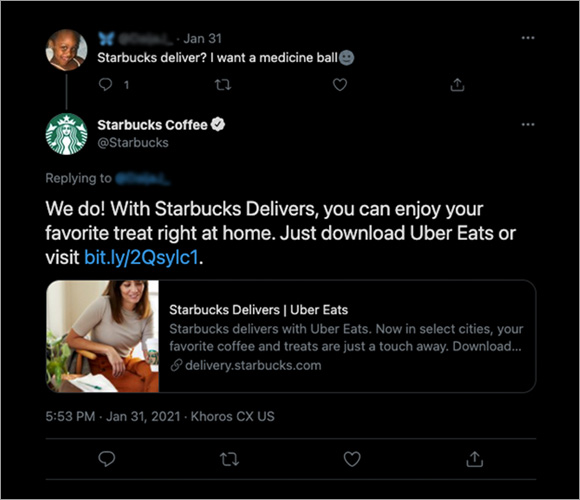
Starbucks & Uber Eats promoting food delivery on social media channels
Connect with your customers using Yo!Yumm’s integrated market-ready solution
Create Valuable Content To Educate Customers
A customer feels connected when given a chance to know the backend working of a restaurant or an enterprise. This encourages faith and strengthens the customer relationship with the company. Allowing your client to your companies in and out, by sharing photographs and videos can give your company a customer-friendly face behind your brand. More than just creating content for your customers, the focus should be on the kind of content being posted. Certain types of content which can encourage customer retention are as follows.
Engaging Content: Beginning with informative and educative content may not allow interacting with the user. The purpose of such content is to appeal to the target audience before we bring forward the educative part.
Educational Content: The next step is to present to your customers the actual potential of your product or service. The main purpose of content is to enhance shareability. It will allow you to reach out to a wider set of audiences and get them to bring their thoughts to you.
Inspirational Content: The key here is to publish resonating content which can pass on to as many readers as possible. For instance, the content about customer testimonials, case studies, and failure and success stories of individuals can be very inspirational.
Offer A Customer Loyalty Program
Loyal customers are very important to the success of a business. Offering loyalty programs helps in retaining customers and prevents potential customers from turning to competitors.
- Personalizing the customer experience: Use customer information to offer tailored products. It goes a long way in understanding consumers’ habits and choices. Moreover, it can help create a successful loyalty program.
- Simplify the Customer Experience: Storing relevant information for shopping, for instance, payment and delivery details simplify the customer shopping experience. In addition to this online offers and redeemable points allow customers to stick to your brand.
Put Together A Customer Referral Program
Before we move further, it is imperative to understand the meaning of a referral program.
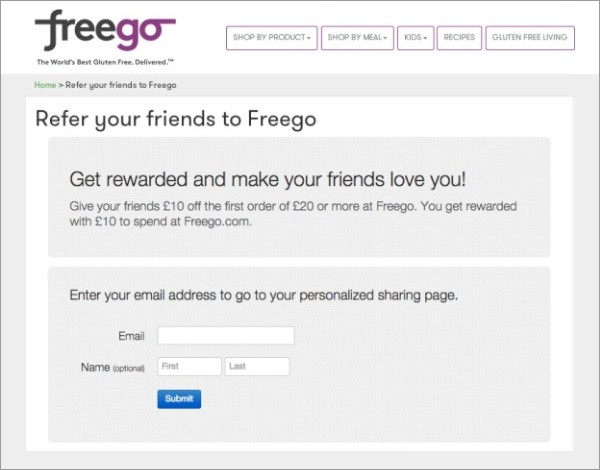
Freego’s Refer a friend Campaign.
- What is a customer referral program?
It is a marketing strategy that encourages your current customers to cite their experiences with your brand with their family and friends. Customers are often provided with coupons and discount cards in return for their loyalty to the company. As per Forbes, referral programs bring the highest conversions as compared to all other marketing channels. Another statistic according to Neilsen states, 84% believe in existing customer referrals before engaging with a brand. A referral program helps in identifying your brand followers and also assists in tracking the website traffic.
- How to integrate a referral program effectively?
Running a referral program successfully can prove to be advantageous for your brand. Some of the points to be kept in mind are:
- Be clear about your product and your offerings.
- Simplify sharing and referring for your customers.
- Regularly promote referral programs.
- How referral programs affect the conversion rate.
As per AMA(American Marketing Association), the size of the reward during referral programs is of the least concern. It reaps equal benefits, whether it’s a $5 coupon or a $20 coupon.
Provide An Exclusive Customer Dashboard
A customer dashboard is a contemporary solution to keep in check all relevant customer Key Product Indicators(KPI) very easily. It helps in effectively visualizing the data. A dashboard provides transparency to the entire work of the system. It builds trust with the customer and enhances chances of customer retention.
Reach out to your customers through YoYumm’s comprehensive customer dashboard
Address Customer’s Complaints On Time
Customer complaints mostly occur when there is a mismatch between what customers desire from the company and what they received. This can also be because of unrealistic expectations from customers, or incorrect assumptions. But if it’s because the company did not live up to its end of the bargain, it is the customer’s right to report issues. Resolved complaints are generally an ice breaker between the company and the customer. A customer generally has a more positive outlook for the company once its complaint is resolved, as compared to the scenario when a customer had no complaints at all. A 5-step process that can help you deal with the customer’s complaints is as follows.
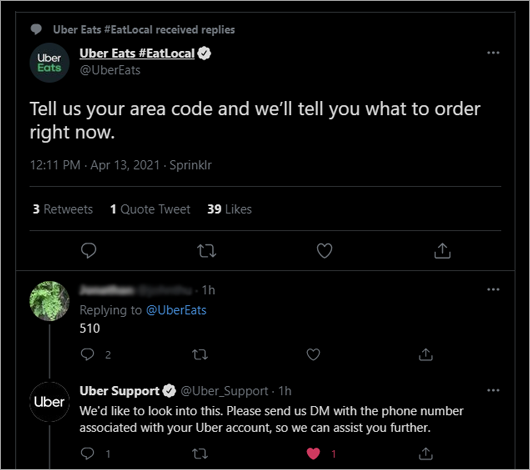
- Find the root cause of the customer complaint: Discovering the exact cause of customers dissatisfaction is one of the most important customer retention strategies for food delivery. Whenever a customer logs in a complaint, make sure you get all the specifics about it. To resolve the complaint, every minute detail is very important. This can be achieved by asking the right questions that will help you dig deeper and reach the root cause of the problem.
- Identify the type of customer: Dealing with customer complaints can be more appropriate when you are aware of the persona of the person you are dealing with. Knowing your customer type can be quite helpful in this case. A few types of customers that you may run into as per a study from the University Of Florida are as follows:
- Customers who are unwilling to share their concerns with you.
- Customers, who pay well, in exchange for excellent service.
- Customers who contact frequently.
- Customers who will switch to another company, after some issue.
- Respond to the customer as soon as possible: An unhappy customer is best to be answered quickly. Such customers if answered before the desired time can be beneficial to the company and may end up being loyal to the company. On the other hand, if such customers are left unattended or delayed, customers can cause potential damage to the reputation of the company.
- Find a solution to their problem: When a customer is looking forward to your support, always find an appropriate solution for the customer. For that, you need to understand their problem and find a solution that will cater to all their needs. Do not step back if the customer needs some extra support, as this will only make the customer more inclined towards the company.
- Followup to check if the issue is truly resolved: There are times when the query is not resolved completely. Keeping a follow-up in such situations is very important. It can help inculcate loyalty to a potential customer for the company.
- Log complaints to keep track: Keeping a log of complaints helps keep a check on the working of the system. It also enhances the productivity of the system by avoiding mistakes again.
Conclusion
As the food delivery trend continues to be on the top charts of the food industry. Several restaurants are coming up with unique ideas to enroll customers in their membership programs or increase subscriptions to their food delivery websites. While it is important to acquire new customers, it is easy and cost-effective to retain them.
The above customer retention strategies can have a positive impact on the business. The sole aim of any business is customer satisfaction. Focussing on the same can bring extensive benefits to both the company and its potential customers.
